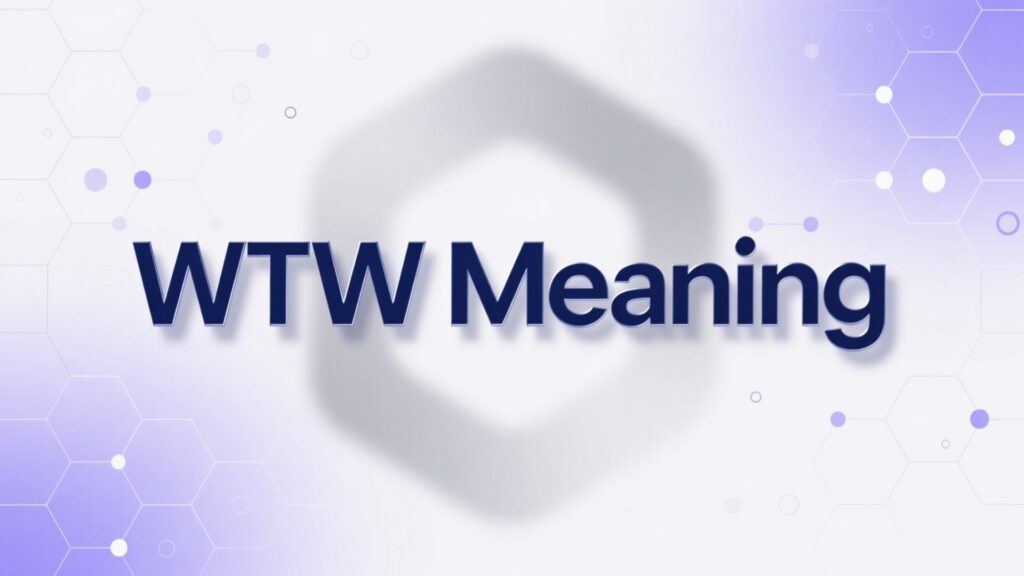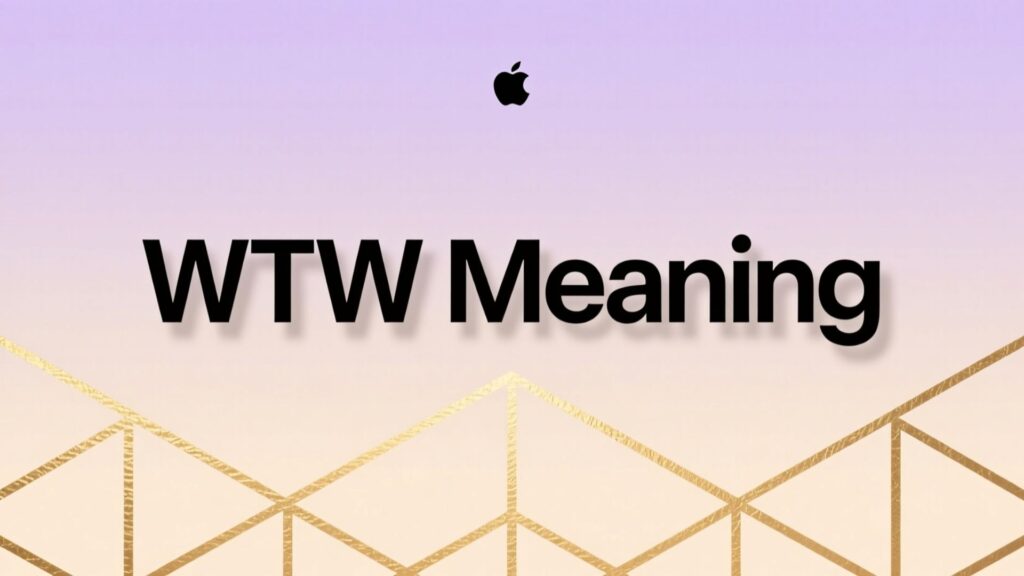Texting and social media slang evolve fast. One day, you’re comfortable saying “LOL”; the next day, someone drops “WTW” and you pause, puzzled. What does WTW mean these days? Is it simply “What’s up?” or does it carry hidden meanings depending on the platform or context?
In this post, you’ll get a deep, modern, and practical exploration of wtw abbreviation, what does wtw mean in snapchat, what is wtw mean, what wtw mean in text, how do you respond to wtw, and many more. You’ll walk away confident using or interpreting “WTW” in chats, DMs, posts, or stories.
Introduction

Slang acronyms fill our texts like little shortcuts “BRB,” “IDK,” “SMH,” to name a few. Among them, WTW has become common, especially in informal conversations. But it’s not always obvious what someone means when they send “WTW.”
This article decodes the various interpretations of WTW, shows you where it’s used (Snapchat, Instagram, TikTok, SMS), gives real examples, advises on how to respond, and warns about possible misunderstandings. Let’s dive in.
Understanding the Acronym “WTW”
- The most common meaning of WTW is “What’s the Word?” a casual version of “What’s up?” or “What’s going on?” (ContentStudio)
- Another popular variant is “What the What?” used to express surprise or disbelief, acting as a softer or cleaner alternative to “WTF.” (Dictionary.com)
- Because slang is flexible, WTW sometimes has niche or playful meanings more on those shortly.
Why slang like WTW arises
- Typing shortcuts reduce effort.
- Slang adds flavor, a sense of belonging, or casual tone.
- In fast digital chats, brevity wins.
Real-life example
Friend A: “Hey – WTW?”
Friend B: “Just chilling, you?”
Here, WTW is clearly the conversational opener meaning “What’s the Word? / What’s up?”
Usage in Texting and Online Communication
Let’s see how what wtw mean in text plays out in real conversations, and how tone, punctuation, or surrounding words shift meaning.
Common texting contexts
- Checking in / greeting
“WTW?” often means “Hey, how are things?” - Making plans
“WTW tonight?” = “What are your plans tonight?” - Transitioning to a topic
Use it to open a chat before diving deeper: “WTW? Did you see that news?” - Reacting to something
If typed with exaggeration (e.g. “WTW!!!”), it can lean toward “What the What?”
Tone and intent – context matters
- Punctuation shifts meaning
- “WTW?” (question mark) tends to be “What’s the Word?”
- “WTW?!” or “WTW!!” hints at “What the What?” (surprise)
- Caps and emojis add flavor
- “WTW 😳” reinforces the “shock/surprise” sense
- “WTW 🙂” stays casual/friendly
- Position in conversation
- At the start: usually “What’s the Word?”
- Mid or after an unexpected statement: might be “What the What?”
Do’s and Don’ts
- Do use WTW among peers, friends, or casual chat settings.
- Don’t use it in formal or professional messaging (e.g., emails, workplace chat with unfamiliar people).
- Do follow it with a clarifying question or response.
- Don’t send it without any context to someone unfamiliar it could confuse them.
Example exchanges
| Sender | Message | Meaning / Interpretation |
|---|---|---|
| A | “WTW?” | What’s going on? / What’s new? |
| B | “Not much you?” | Typical response to check-in |
| A | “WTW tonight?” | Asking plans for the evening |
| B | “Dinner + movie, you in?” | Direct reply with plan |
| A | “WTW?!” | Expressing surprise at a statement |
| B | “Seriously, that’s wild!” | Echoing surprise |
Usage on Social Media Platforms
Acronyms like WTW travel differently on each platform. Let’s look at what does wtw mean in snapchat, and also Instagram, TikTok, Twitter, etc.
Snapchat
On Snapchat, people often use WTW to start a chat or ask what someone is doing. (Screen Rant)
Examples:
- DM: “WTW today?”
- Snap captions: “WTW?” over a snap of you doing something or waiting for a response
Because Snapchat is casual and ephemeral, WTW fits right in quick, informal, low-stakes.
Instagram & Facebook
On Instagram, WTW appears in DMs, stories, captions, or replies. Users may caption a post with “WTW?” to invite followers to comment. (Medium)
Example:
- Post: “Saturday vibes 🕶️ WTW?”
- DM: “WTW this weekend?”
On Facebook, it’s less common because the tone tends to tilt more formal but in Messenger or group chats, WTW can show up.
Twitter / X
Here, WTW can be used to:
- Start DMs: “WTW?”
- Engage followers: “WTW for tonight’s game?”
- React in a thread: “WTW?!” after surprising news
TikTok
- In comments: “WTW? 😂”
- In video captions (especially if the video invites engagement)
- As part of slang trends or challenges
Summary table
| Platform | Common Use of WTW | Examples |
|---|---|---|
| Snapchat | Friendly DM opener | “WTW tonight?” |
| Captions, DMs, stories | “WTW this weekend?” | |
| Twitter / X | Conversation starter or reaction | “WTW on this?” |
| TikTok | Comments, captions | “WTW? 😂” |
Each platform’s tone matters: Snapchat and TikTok lean casual, whereas Instagram might mix casual and curated, and Twitter often mixes personal and public tone.
Alternative Meanings of “WTW”

Because slang is flexible, WTW can carry more than one meaning. Always use context clues to decide which meaning fits best. Below are popular alternatives plus less common ones.
“Slang is context-dependent the same letters can mean different things depending on who’s talking, to whom, and where.”
Common alternative meanings
- What’s the Wave?
Similar to “What’s the Word?” but leans more toward asking what’s trending or what’s the social plan. You might hear “WTW tonight?” meaning “What’s the wave tonight?” as in, what are we doing? - Worth the Wait
Used when something took time a song, movie, or deliverable was delayed but the result was satisfying.
Example: “That sequel was WTW.” - Walk the Walk
A motivational or accountability phrase meaning “show action, not just talk.”
Example: “You gotta WTW not just talk about it.” - Welcome to Work
Used ironically or humorously in office settings.
Example: “Monday morning, inbox full… WTW?” (i.e. welcome to work) - What to Watch
In entertainment or streaming discussions.
Example: “WTW on Netflix this weekend?”
Less common / niche meanings
- What’s the Way? asking direction or plan.
- Woman to Woman used in feminine groups for solidarity.
- Corporate or brand acronyms
- Willis Towers Watson (global insurance/consulting firm) (Wikipedia)
- Water Treatment Works in engineering contexts (Wikipedia)
Good clues for picking the right meaning
- Is it a casual chat or serious discussion?
- What platform is this (Snapchat, work email, IG comment)?
- Are other slang or emoticons around it?
- Does “surprise tone” (exclamations) exist?
Responding to “WTW”
When someone texts “WTW,” how do you pick the right response? Your reply depends on which meaning they intended and how close you are to them. Here are strategies and example responses for various contexts.
Step 1: Judge the meaning and tone
- If it seems like a greeting or check-in → use a casual friendly reply.
- If it seems like surprise → mirror or amplify that reaction.
- If it’s question about plans or ideas → offer suggestions or ask back.
Example response types
- For “What’s the Word?” / casual check-in
- “Not much, just chilling. You?”
- “Just finished work. WTW with you?”
- “Busy day, but free later WTW?”
- For “What the What?” / surprise reaction
- “WTW! Didn’t see that coming.”
- “I know, right? That’s wild.”
- “OMG, WTW? That’s crazy.”
- For “What to Watch / What to Wear / Worth the Wait”
- If asking for a show: “WTW? Try Stranger Things it’s great.”
- If asking outfit: “Go with jeans + blazer WTW is casual-chic.”
- If praising: “Yes, it was WTW absolutely worth the wait.”
Tips for good replies
- Mirror their tone (if casual or surprised).
- Add a question back to keep conversation going.
- Use an emoji for tone if needed.
- Don’t overthink simpler is often better in slang chat.
Alternatives to “WTW”
If “WTW” doesn’t feel right or you want variation, here are other slang phrases you can use. They often overlap in meaning, but each has its nuance.
| Alternative | Full Meaning | Typical Use / Nuance |
|---|---|---|
| WYD | What You Doing? | More specific about current activity |
| Sup | What’s Up? | Universal, casual |
| HRU | How Are You? | More personal, emotional check-in |
| What’s New? | — | Asking for new events or updates |
| Any Plans? | — | Asking about upcoming schedule |
| What’s Happening? | — | General inquiry |
| How’s It Going? | — | Light, polite check-in |
| What’s Good? | — | Urban slang flavor |
| What’s Poppin’? | — | Trendy greeting |
| What’s the Scoop? | — | Asking for news or gossip |
| What’s Crackin’? | — | Relaxed, casual greeting |
Use the one that fits your style and your audience. For example, HRU is friendlier and more emotionally tuned, while Sup is breezy and generic.
Cultural and Generational Context
How people interpret or adopt wtw abbreviation can depend heavily on age, region, and subcultures. Here’s a closer look.
Generational differences
- Gen Z (born ~1997–2012)
- Probably already know WTW or similar slang.
- Use it fluidly, often without thinking.
- Millennials (born ~1981–1996)
- Many understand WTW but might use (or reply with) more traditional phrases like “What’s up?”
- Older generations
- Might see WTW as confusing.
- Less likely to initiate messages with acronyms unless familiar with texting culture.
Regional / cultural difference
- Some regions lean more into local slang or adopt variants (e.g., “What’s the Wave?”)
- In multi-language zones, people may mix English acronyms with local language “WTW? Kya scene?”
Slang spread & evolution
- Memes & social media often accelerate slang adoption
- Music, rap lyrics, TV shows imprint expressions into culture
- Online communities (e.g., Discord, Reddit) help popularize new usages
Common Mistakes and Misinterpretations
Using WTW wrong can lead to awkwardness. Let’s identify pitfalls and how to avoid them.
- Using WTW in formal settings
Don’t drop “WTW” in professional emails or with people you don’t know well. It can look lazy or unprofessional. - Assuming one meaning always
Failing to consider tone or punctuation may result in misunderstanding (e.g., thinking surprise when someone meant greeting). - Using it too often
Flooding your messages with acronyms makes you sound robotic or forced. - Ignoring audience
If someone isn’t familiar with texting slang, they may get confused better use full phrases with them. - Misreading intent
Someone might use “WTW?” just to start chat, not as a serious question. Overreacting in your reply can shift tone awkwardly.
Related Internet Slang Terms
Knowing WTW is good knowing its neighbors is better. Here are commonly used acronyms and how they connect or contrast.
| Acronym | Meaning | Common Use / Relation to WTW |
|---|---|---|
| LMK | Let Me Know | Follow-up after or in reply to WTW you may say “LMK.” |
| IDC | I Don’t Care | Casual response; less about inquiry. |
| IDK | I Don’t Know | Opposite direction: you lack info. |
| FR | For Real | Express sincerity. |
| ONG | On God | Emphasis or affirmation. |
| TBH | To Be Honest | Prefacing frank thoughts. |
| NGL | Not Gonna Lie | Introducing confession. |
| HMU | Hit Me Up | Invitation to reach out. |
| WYA | Where You At | Asking location, not just what’s up. |
| WSP | What’s Poppin’ | Similar vibe greeting. |
These acronyms often appear together in casual chats, and knowing them helps you read the room better.
Summary Table: “WTW” at a Glance
| Category | Description / Key Points |
|---|---|
| Primary Meaning | What’s the Word? (i.e., What’s up?) |
| Alternate Primary | What the What? (surprise) |
| Other Meanings | Worth the Wait, Walk the Walk, What to Watch, Welcome to Work |
| Tone / Usage | Casual, friendly, slangy fits DMs, texts, social posts |
| Best Platforms | Snapchat, Instagram, TikTok, SMS |
| Alternatives | WYD, Sup, HRU, What’s the Scoop, etc. |
| Pitfalls | Overuse, wrong context, formal misuse |
Case Studies & Real Examples
Let’s look at some real or realistic scenarios where WTW showed up, how people interpreted and responded, and lessons to learn.
Case Study 1: WTW in Snapchat
Scenario
A friend you haven’t chatted with for a week sends:
“WTW?”
Interpretation
They’re likely checking in. They don’t need details, just want to reconnect.
Good Response
“Hey! Not much just relaxing. You?”
Lesson
WTW is safe as a casual opener. It invites conversation without pressure.
Case Study 2: WTW in a Surprising Post
Scenario
On Instagram, someone posts a wild story: “Just bumped into Beyoncé in my city… WTW?!”
Interpretation
Here, “WTW?!” leans toward “What the What?” expressing shock at a surprising event.
Good Response
“WTW that’s incredible! Did she stop to talk?”
Lesson
When used in a post or caption, WTW can be expressive, not just conversational.
Case Study 3: WTW in Planning
Scenario
Group DM:
Alice: “WTW Saturday night?”
Ben: “Nothing planned yet.”
Claire: “Let’s hit that new café.”
Interpretation
Alice used WTW to initiate a plan. Others respond with options.
Lesson
WTW works as plan-starter; conversation flows naturally afterward.
How “WTW” Relates to Other Acronyms
Sometimes people confuse WTW with similar acronyms. Here’s how to distinguish them:
- WTW vs WYD
- WYD (What You Doing?) is more specific: “What are you doing now?”
- WTW is broader: “What’s up / What’s new?”
- WTW vs Sup / What’s Up
- “Sup” is even more casual; WTW adds a slight nuance or flavor.
- WTW vs HRU
- HRU (How Are You?) is more about well-being; WTW is about what’s going on.
Understanding these shades helps you choose the one that fits your tone.
How Do You Respond to WTW?
We’ve touched on this before, but here’s a consolidated guide for how do you respond to wtw in different settings.
Response guidelines
- Mirror tone (casual, surprised, friendly)
- Add something (a detail, question, or plan)
- Use an emoji if needed to soften or add personality
Sample responses
| If WTW Means | Sample Responses |
|---|---|
| What’s the Word? (greeting) | “Hey! Just relaxing. You?” “All good here. WTW on your side?” |
| Surprise / What the What? | “WTW?! That’s wild.” “I literally just said “WTW” when I read that.” |
| Asking for plan / recommendation | “WTW? Let’s catch a movie.” “I’d say Inception. WTW with you?” |
You can mix and match depending on your vibe and relation.
Frequently Asked Questions
Q: What does WTW mean in Snapchat?
A: On Snapchat, WTW almost always means “What’s the Word?” i.e. “What’s up?” or “What are you doing?” (Screen Rant)
Q: What does WTW mean in general?
A: The primary meaning is “What’s the Word?” casual greeting or check-in. But it can also mean “What the What?” (surprise) or less frequently “Worth the Wait,” “Walk the Walk,” etc.
Q: What does WTW mean in text?
A: In text messages, WTW functions as a conversational opener: “What’s up?” or to express surprise depending on context.
Q: How do you respond to WTW?
A: Tailor your reply based on meaning and tone.
- If greeting: share what you’re doing + ask them.
- If surprise: mirror their reaction.
- If asking advice or plans: give your take + ask back.
Q: Is WTW rude or friendly?
A: Mostly friendly intentions matter. In casual settings among friends it’s harmless. But misuse or surprise tones can make someone misinterpret it.
Q: Can you use WTW in formal settings?
A: Best to avoid it in formal or professional communication. Use full, clear phrases instead.
Final Thoughts
Slang evolves as fast as memes; “WTW” is one of those acronyms that’s simple yet flexible. In most contexts, it means “What’s the Word?” a casual greeting or check-in. But used with different tone or punctuation, it can also mean “What the What?”, or venture into meanings like Worth the Wait, Walk the Walk, or What to Watch.
To use wtw abbreviation well:
- Read the tone & context before interpreting.
- Respond matching tone + adding something to keep the chat alive.
- Use alternatives when WTW doesn’t fit.
- Avoid using it where it would confuse or seem unprofessional.
Next time someone sends “WTW?” in your DMs no panic. You’ll know exactly what to say.
Bugti is the founder of Quoethint.com, a hub for English language tips, writing advice, and grammar guidance. With years of experience in English studies and a passion for clear communication, Bugti created this platform to make grammar and writing easy to understand for everyone.
